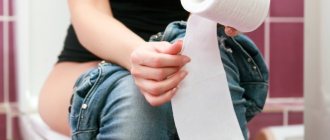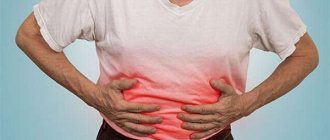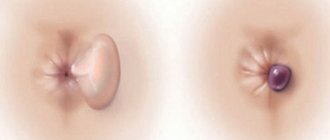Almost everyone experiences constipation from time to time, but women are especially prone to this problem, and constipation before menstruation is one of the most common complaints of premenstrual syndrome (PMS). Let's look at the causes of constipation before your period and the steps you can take to deal with it.
What Causes Constipation Before Menstruation?
The main culprit of premenstrual constipation is the sex hormone progesterone. Progesterone levels are highest in the second half of the menstrual cycle, called the luteal phase, after ovulation.
During ovulation, the ovary releases an egg that matures that month. The remains of the follicle in which this egg developed turns into a temporary gland, which releases large amounts of progesterone. This hormone, which enters the body, is necessary to support the viability of the embryo (if you are lucky enough to become pregnant this month).
During the two weeks before your next menstruation, progesterone will work to relax the muscles of the uterine wall and gastrointestinal tract. This allows the fertilized egg to implant in the uterine wall and receive more nutrients from the foods you eat, which is optimal for starting the pregnancy process.
The only trouble in this case is that relaxed intestinal muscles cause the bolus of food to move through the gastrointestinal tract more slowly, as a result of which more water will be removed from the stool. The result is hard, dry stools that are more difficult to pass. And the consequence is constipation before menstruation, the cause of which is the specific work of progesterone.
Treatment
For the smooth functioning of the digestive system, regular prevention of constipation before menstruation helps. If it was not possible to follow all the recommendations, then constipation during menstruation and on the eve of its onset can be eliminated by using traditional remedies and medications.
If fecal matter needs to be softened and liquefied, it is recommended to take Picolax drops. They do not speed up motility, do not strain peristalsis, and do not reduce the absorption of contents by the intestinal walls. Therefore, they are considered safer than other drugs. Glycerin rectal suppositories work similarly.
If the process of defecation still does not occur for a long time, you can switch to laxatives, the action of which is based on reducing absorption by the intestinal walls, as well as accelerating the work of peristalsis. The first thing you can try is magnesium preparation. An additional bonus after taking it will be a decrease in appetite, and the need to switch to a sharp reduction in the amount of food consumed. After taking magnesium, you should give up gastronomic excesses. The most reasonable thing in this case would be to give up unhealthy foods and go on a strict diet.
Senade, Duphalac and other drugs can be used as traditional laxatives. All these medications can be used only if they are recommended by your attending physicians, or if you have experience taking them in the past. It is better to take drugs that increase motility in case of decreased appetite, general lethargy and weakness of the body, since, most likely, constipation is atonic in nature. Among prokinetics, the most common is Motilium. It is advisable to combine laxatives with calcium supplements and probiotics such as Linex.
When irritability increases before menstruation, nerves begin to fray, and defecation is delayed, you need to help the intestinal walls relax, since, apparently, spastic constipation occurs. Taking the drug "Fitosed", infusions of herbs that have a calming effect, improves the condition of the nervous system, which has a positive effect on the functioning of the gastrointestinal tract.
Remedies for constipation before menstruation
There are probably no special remedies that would help cope with the surge of progesterone, but this does not mean that there is no way to deal with premenstrual constipation.
For example, over-the-counter laxatives or stool softener suppositories, which can be purchased at the pharmacy. Although laxatives are not suitable for everyone and you need to be very careful, especially if you suspect that you are pregnant. There are also traditional medicine methods that you can try to cope with this unpleasant problem.
Self-massage of the abdomen
Abdominal massage is a safe and effective way to help relieve gastrointestinal problems such as bloating, constipation and colic. Massage stimulates the intestines, helping the food bolus move through it faster.
Doctors have been using belly massage to treat constipation since the 19th century, but you can try a simplified version of this massage at home: massage your belly in gentle clockwise circles and rub your belly from right to left with your hands.
More water
Water is needed to move food waste through the digestive system, so make it a habit when you wake up to drink a glass of cold water first to get your bowels moving. But don't forget about water during the day - to avoid constipation, experts recommend drinking 8 to 10 glasses of liquid every day.
Dietary fiber against constipation before menstruation
Dietary fiber helps stimulate intestinal activity, so it is useful for constipation. You can snack on small portions of fresh fruit with edible skin - prunes, apricots, peaches or berries.
Healthy foods such as flaxseed, bran cereal or psyllium fiber are also good additions to regular meals to help increase your fiber intake.
Main symptoms
Constipation is said to occur when there is no normal bowel movement for more than 48 hours. Constipation before menstruation can be atonic or spastic, and each form has characteristic symptoms. The atonic form of the pathology is accompanied by bloating, a feeling of intestinal fullness and a deterioration in general well-being. Manifestations of spastic constipation are pain in the intestines, rumbling, flatulence, lethargy and weakness.
How does constipation manifest before menstruation?
In addition to abdominal discomfort, many women experience the following symptoms during the premenstrual period:
- increase in body weight by 2-3 kg;
- sudden mood swings, tearfulness and irritability;
- headache;
- constant thirst;
- lethargy, drowsiness, decreased performance.
What is PMS
Constipation and other symptoms of dysfunction that occur before your period do not pose a health risk if bowel function returns to normal after the hormonal storm subsides. In cases where the pathology becomes permanent, you should consult a specialist and undergo a comprehensive diagnosis - constant delays in defecation can cause intoxication of the body and other unpleasant consequences.
Attention: you can distinguish spastic constipation from atonic constipation with the help of antispasmodic drugs (No-shpa, Drotaverine) - in the spastic form of the pathology, after taking the pills, the symptoms disappear, but the atonic form does not respond to such therapy.
Drotaverine
Prevention of premenstrual constipation
If constipation is the main complaint on your list of premenstrual symptoms, lifestyle changes over the course of the month will help reduce these symptoms.
Nutrition
A diet rich in plant foods will help you get the fiber you need to prevent constipation. Make sure there are vegetables and fruits in every serving you eat.
On the other hand, avoid foods cooked in fat and keep fast food and baked goods to a minimum.
To support gut health, include probiotic foods whenever possible. These include fermented milk products: yogurt, kefir; sauerkraut, tea and milk mushroom.
Exercises
Regular exercise helps improve bowel function. Even if you don't even have the desire to push yourself to run marathons, when you're in the thick of PMS, you can add more activity by making simple changes to your daily routine, such as taking the stairs instead of the elevator, or walking for half an hour.
Developing a regular habit
Train your bowels to have a bowel movement at the same time every day. For example, after waking up or having breakfast. And over time this becomes the norm. Don't strain or sit for too long if you can't walk for long, as this can cause hemorrhoids.
Prevention Tips
When preventing constipation, proper organization of the diet is of particular importance. A woman needs to give up sweets, smoked foods, confectionery, baked goods and alcohol. Salty and spicy foods should be consumed in moderation. You also need to make sure that your diet does not contain too many carbohydrates.
Many women who experience constipation before menstruation do not know what to do in this situation. In fact, avoiding such problems is quite simple. Instead of forbidden foods, you need to include in your diet:
- corn, sunflower, flax and olive oil;
- Rye bread;
- various dried fruits, in particular dried apricots;
- foods that contain large amounts of fiber;
- hibiscus and green tea;
- vegetables in unlimited quantities;
- fermented milk products with minimal fat content.
Drinking regime is of no small importance in normalizing intestinal function. A woman needs to drink a lot of water before her period begins. The body should receive at least 2.5 liters of fluid per day.
Restoring the activity of the gastrointestinal tract system is a long and painstaking process. It is not always possible to normalize the functioning of the intestines by following only one diet. In this case, you need to follow additional recommendations:
- spend more time outdoors;
- exercise;
- give preference to active types of recreation;
- give up bad habits (drinking alcohol and smoking).
A relaxing massage will help relieve constipation during menstruation. Yoga can improve the tone of the digestive system.
Constipation before menstruation as an indicator of pregnancy
The increased level of progesterone, which causes constipation before menstruation, normalizes with the onset of menstruation, and the problem with stool retention resolves on its own. However, if you are lucky enough to become pregnant, your progesterone levels will remain high to support the pregnancy.
It is a fact that constipation is a common complaint of early pregnancy, but of course, it is not correct to assume the fact of ovulation based on constipation. Wait until the day your period starts on your regular schedule.
If your period hasn't started, buy a reliable pregnancy test and get tested a week after your period was supposed to start. If the result is negative and constipation is present, see your doctor to find out what's going on.
Conclusion
Constipation before your period can be both physically and mentally uncomfortable, but remember that you are not alone. This is a natural effect of the sex hormone progesterone on the intestines. By changing your lifestyle or starting to take medications, you can help your body cope with this unpleasant problem.
How to get rid of bloating
You can eliminate the problem of flatulence by following simple rules.
Diet
Bloating before menstruation is often caused by rotting undigested foods and excess fluid in the body. Therefore, to get rid of this problem, you need to follow the rules of healthy eating and diet:
- A week before your period, it is recommended not to eat foods containing fats and carbohydrates. Food these days should be as gentle as possible on the gastrointestinal tract. Beans, flour products, cabbage, and powdered sugar should be excluded from the diet.
- You need to eat foods rich in proteins, such as eggs and milk.
- It is necessary to completely exclude salted and smoked foods from the diet, which retain fluid in the body, causing edema.
- To prevent flatulence, you should give up carbonated drinks a week before menstruation.
- During your period and the week before, you should eat foods rich in magnesium and vitamin B.
Drug treatment
Treatment for bloating before menstruation should be prescribed by a doctor. There are medications that help relieve swelling and remove accumulated gases from the intestines.
This mission is best accomplished by sorbents, which act like a sponge in the stomach, absorbing pathogens, waste and toxins. These substances negatively affect intestinal motility, contributing to water retention in the body.
So, medications that can help you get rid of the problem of bloating before menstruation:
- Activated carbon.
- White coal.
- Enterosgel.
- Polysorb.
- Espumisan.
- Pepsan-R.
- Motilium.
- Neobutin.
- Lactofiltrum.
- Linux.
- Mezim.











